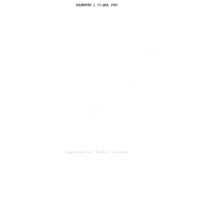-
Title
-
Trajectory Versus Line-of-Sight Space Rendezvous Using Out-of-Window Visual Cues
-
Date
-
1965
-
Index Abstract
-
Not Available
-
Photo Quality
-
Complete
-
Report Number
-
AMRL TR 65-10
-
Corporate Author
-
Behavioral Sciences Laboratory
-
Laboratory
-
Behavioral Sciences Laboratory
-
Extent
-
68
-
Identifier
-
AD0615157
-
Access Rights
-
CFSTI
-
Distribution Classification
-
1
-
Contract
-
Laboratory Research - No Contract
-
DoD Project
-
7184
-
DoD Task
-
718401
-
DTIC Record Exists
-
No
-
Distribution Change Authority Correspondence
-
None
-
Distribution Conflict
-
No
-
Abstract
-
Seven trained subjects flew simulated short range coplanar orbital rendezvous maneuvers, using direct visual cues only. Two rendezvous techniques were compared: line-of-sight and trajectory. In the former, the subject could control up-down and fore-aft thrust only; in the latter, he could, in addition, control pitch. Using either technique, all subjects were able to maneuver successfully to a position 100 ft directly in front of the target at a terminal velocity of less than 5 ft/sec. Significantly, less fuel was expended in performing the trajectory maneuver. The principal man-machine performance factors in the line-of-sight maneuver were tentatively described as (1) the ability to conserve fuel used for longitudinal and vertical translation, (2) the ability to conserve mission time, and (3) the ability to proficiently close with the target. The principal factors for the trajectory maneuver were tentatively described as (1) the ability to conserve fuel for longitudinal translation, (2) the ability to conserve mission time, (3) the ability to effectively apply longitudinal thrusts and conserve fuel used for vertical translation, and (4) the ability to match the trajectory path of a minimum fuel two impulse maneuver. Computer diagrams fully describing the analog simulation are included.
-
Report Availability
-
Full text available
-
Date Issued
-
1965-02
-
Provenance
-
RAF Centre of Aviation Medicine
-
Type
-
report
-
Format
-
1 online resource
-
Creator
-
Clark, Herbert J.
 AMRLTR65-010.pdf
AMRLTR65-010.pdf